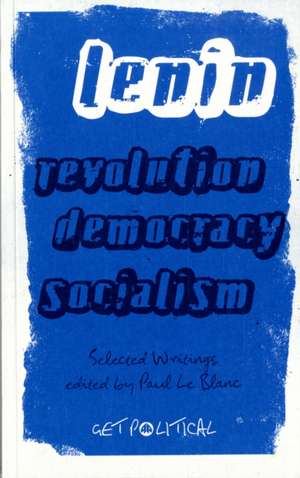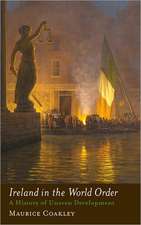Revolution, Democracy, Socialism: Selected Writings of V.I. Lenin
Autor V. I. Leninen Limba Engleză Paperback – 19 sep 2008
Lenin has been much maligned in the mainstream, accused of viewing 'man as modeling clay' and of 'social engineering of the most radical kind.' However, in contrast to today's world leaders, who happily turn to violence to achieve their objectives, Lenin believed it impossible to reach his goals 'by any other path than that of political democracy.'
This collection will be of immense value to students encountering Lenin for the first time, and those looking for a new interpretation of one of the 20th century's most inspiring figures.
Preț: 232.41 lei
Nou
Puncte Express: 349
Preț estimativ în valută:
44.47€ • 46.56$ • 36.89£
44.47€ • 46.56$ • 36.89£
Carte tipărită la comandă
Livrare economică 10-24 aprilie
Preluare comenzi: 021 569.72.76
Specificații
ISBN-13: 9780745327600
ISBN-10: 0745327605
Pagini: 376
Ilustrații: 1 table
Dimensiuni: 135 x 215 x 28 mm
Greutate: 0.48 kg
Editura: PLUTO PRESS
Colecția Pluto Press
ISBN-10: 0745327605
Pagini: 376
Ilustrații: 1 table
Dimensiuni: 135 x 215 x 28 mm
Greutate: 0.48 kg
Editura: PLUTO PRESS
Colecția Pluto Press
Notă biografică
V.I. Lenin was a pivotal figure in twentieth century politics. He was a theoretician, revolutionary leader and activist. He wrote widely and Imperialism, his best known work, combines scholarship and biting political analysis.
Cuprins
TEN REASONS FOR NOT READING LENIN
by Paul Le Blanc
1. Lenin
2. Lenin's Critics
3. His Time and Ours
4. Further Reading
LENIN'S SELECTED WRITINGS, 1895-1923
I. Marxist Program and Revolutionary Organization
1. 1895-6: Draft and Explanation of a Program of the Social Democratic Party
2. 1897-9: The Development of Capitalism in Russia
3. 1899: Our Program
4. 1899: Our Immediate Task
5. 1899: Fuse Socialism with the Workers' Movement
II. Birth of Bolshevism
6. 1900: The Urgent Tasks of Our Movement
7. 1902: What Is To Be Done?
8. 1903: To the Rural Poor
9. 1904: One Step Forward, Two Steps Back: Reply to Rosa Luxemburg
10. 1904: Against Subordination to Liberals
III. 1905: Challenges of the Revolutionary Upsurge
11. 1905: The Beginning of the Revolution in Russia
12. 1905: A Militant Agreement for the Uprising
13. 1905: Two Tactics of Social Democracy in the Democratic Revolution
14. 1905: Our Tasks and the Soviet of Workers Deputies
15. 1905: Socialism and Religion
IV. Creation of the Bolshevik Party
16. 1906: Freedom to Criticize and Unity of Action
17. 1909: Break with Ultra-Left Bolsheviks
18. 1912: Final Break with the Mensheviks
19. 1914: Report to Brussels
V. Imperialist War, National Liberation, Revolutionary Democracy
20. 1913: The Historical Destiny of the Doctrine of Karl Marx
21. 1915: Socialism and War
22. 1915: The Revolutionary Proletariat and the Right of Nations to Self-Determination
23. 1916: Imperialism, The Highest Stage of Capitalism
24. 1917: Statistics and Sociology
VI. 1917 Revolution
25. 1917: Letters on Tactics
26. 1917: The State and Revolution
27. 1917: To the Population: Take Power in Your Own Hands
28. 1918: Dissolution of the Constituent Assembly
VII. World Revolution
29. 1918: Letter to American Workers
30. 1919: The Third International and Its Place in History
31. 1920: Left-Wing Communism, An Infantile Disorder
32. 1921: Speech on Tactics of the Communist International
VIII. Reaching for Socialism, Resisting Bureaucracy
33. 1919: Tasks of the Working Women's Movement
34. 1919: Comments to Congress on Adult Education
35. 1920: On the Trade Unions
36. 1921: The Party Crisis
37. 1923: Better Fewer, But Better
Index
by Paul Le Blanc
1. Lenin
2. Lenin's Critics
3. His Time and Ours
4. Further Reading
LENIN'S SELECTED WRITINGS, 1895-1923
I. Marxist Program and Revolutionary Organization
1. 1895-6: Draft and Explanation of a Program of the Social Democratic Party
2. 1897-9: The Development of Capitalism in Russia
3. 1899: Our Program
4. 1899: Our Immediate Task
5. 1899: Fuse Socialism with the Workers' Movement
II. Birth of Bolshevism
6. 1900: The Urgent Tasks of Our Movement
7. 1902: What Is To Be Done?
8. 1903: To the Rural Poor
9. 1904: One Step Forward, Two Steps Back: Reply to Rosa Luxemburg
10. 1904: Against Subordination to Liberals
III. 1905: Challenges of the Revolutionary Upsurge
11. 1905: The Beginning of the Revolution in Russia
12. 1905: A Militant Agreement for the Uprising
13. 1905: Two Tactics of Social Democracy in the Democratic Revolution
14. 1905: Our Tasks and the Soviet of Workers Deputies
15. 1905: Socialism and Religion
IV. Creation of the Bolshevik Party
16. 1906: Freedom to Criticize and Unity of Action
17. 1909: Break with Ultra-Left Bolsheviks
18. 1912: Final Break with the Mensheviks
19. 1914: Report to Brussels
V. Imperialist War, National Liberation, Revolutionary Democracy
20. 1913: The Historical Destiny of the Doctrine of Karl Marx
21. 1915: Socialism and War
22. 1915: The Revolutionary Proletariat and the Right of Nations to Self-Determination
23. 1916: Imperialism, The Highest Stage of Capitalism
24. 1917: Statistics and Sociology
VI. 1917 Revolution
25. 1917: Letters on Tactics
26. 1917: The State and Revolution
27. 1917: To the Population: Take Power in Your Own Hands
28. 1918: Dissolution of the Constituent Assembly
VII. World Revolution
29. 1918: Letter to American Workers
30. 1919: The Third International and Its Place in History
31. 1920: Left-Wing Communism, An Infantile Disorder
32. 1921: Speech on Tactics of the Communist International
VIII. Reaching for Socialism, Resisting Bureaucracy
33. 1919: Tasks of the Working Women's Movement
34. 1919: Comments to Congress on Adult Education
35. 1920: On the Trade Unions
36. 1921: The Party Crisis
37. 1923: Better Fewer, But Better
Index













